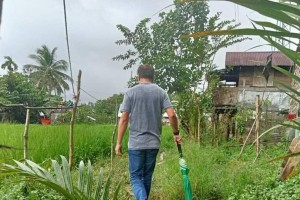Located in the vast rice fields of Jipapad in Eastern Samar, a small hut offers comfort to a soon-to-be family of five whose main source of living is coconut farming.
Salvador Bernas, head of the family, sustains his family’s daily needs through seasonal coconut farming, or “paglukad.” However, he occasionally faces the perennial problem of strong typhoons and rainy seasons affecting farmers in the province. He also deals with the downward trend of copra’s buying prices recently.
To make ends meet during the non-copra season, Tatay Salvador shared that he works as a laborer on whatever job is available, earning as little as P50 and up to P500 at most.
Meanwhile, Nanay Ida, pregnant with their third child, has been an active Barangay Health Worker (BHW) in their community since 2017.
Despite the couple’s determination to put food on the table, the family’s financial limitations hinder their ability to access sufficient and nutritious food. As a result, their offspring are tagged as malnourished children in Jipapad.

Teaming up against malnutrition
To gain a deeper understanding of the situation and develop a long-term and effective solution to combat malnutrition in the province, a team consisting of Eastern Samar Governor Ben Evardone, Regional Director Exuperia Sabalbarino of the Department of Health Region 8, Maria Ivy Rochelle Tan of the UP Manila School of Health and Sciences, and Jipapad Mayor Benjamin Ver personally visited families with malnourished children in the remote barangays of Jipapad on January 5, 2024.
When Evardone asked Tatay Salvador about the family’s alternative source of income during the non-copra season, he replied, “Danay nagli-labor nala, naghahakot (lukad) danay ma ak daman yadi ha salog nagba-baggage (I do labor works like transporting sacks of copra downstream; sometimes I stay by the river carrying people’s items of baggage).”
Meanwhile, Nanay Ida shared that although she is knowledgeable about preparing nutritious food for her children as a BHW, their financial situation limits them from purchasing healthy food.
She also appealed to the governor for a livelihood opportunity that would enable them to provide for her growing family.
Consequently, the governor identified an untapped piece of land in the area that could be used for planting vegetables. This would provide nutritious food for their children and generate additional income for the family.
The provincial government promptly delivered seedlings to Tatay Salvador and Nanay Ida soon after their visit. The aim was to provide immediate relief and long-term support for the family.
After conducting household visits, the team organized a pivotal stakeholders' evaluation and consultative meeting in Jipapad.
According to Rocajane Salac, the designated Information Officer of the Province of Eastern Samar, the meeting concluded fruitfully. The team agreed to devise effective solutions, such as programs and projects, to address the region’s malnutrition and other pressing health issues.

Capacitating small-scale farmers
The Office of the Provincial Agricultural Services (OPAS) took a lead role on January 9 in empowering local communities by providing them with the necessary resources and knowledge to engage in sustainable agriculture. As part of this effort, the OPAS handed over agricultural materials to 44 beneficiaries of the Department of Agriculture's Special Area for Agricultural Development - Enhanced Vegetable Gardening Project.
Each beneficiary received a comprehensive package that includes a plastic drum with a 200-liter capacity, a plastic jug with a 20-liter capacity, a set of farm tools (rake, dull bolo, plastic sprinklers, pick mattock with wooden handle), a plastic crate, 25 kg each of complete and urea fertilizer, and one bag of organic fertilizer.
Meanwhile, a distribution of 10-kilo well-milled rice to over 150 small-scale farmers affected by the flooding in Jipapad was also conducted.

Mayor Ver underscored the importance of eradicating hunger within the community, highlighting the collaborative efforts of the government towards food security.
"It aton mga partners didi ha national government, dinhi ha provincial government nakikita niyo pinupuntahan na tayo didi ha Jipapad panghatag hin mga kalungganayan, mga proyekto ngan programa nga makakasustiner hit aton panginahanglan dinhi ha bungto hiton Jipapad. (As you can see, our partners in the national and provincial government personally visited us to provide us with programs and projects that will sustain our needs here in Jipapad)," Mayor Ver said.
The initiative garnered heartfelt gratitude from the Sitio Kasapa Farmers Association, which expressed their appreciation for the significant support and opportunities provided by the government.
"Giuupayi in ngan gidadako-i in nga opurtunidad para haamon, dako nala nga salamat, buligi kami niyo kay mabulig daman kami ha iyo. (This is a huge opportunity for us farmers; thank you, help us, and we will contribute greatly to helping the community)," Edelio Bajado, Sitio Kasapa Farmers Association president, remarked. (AAC/VTG/PIA Eastern Samar)




